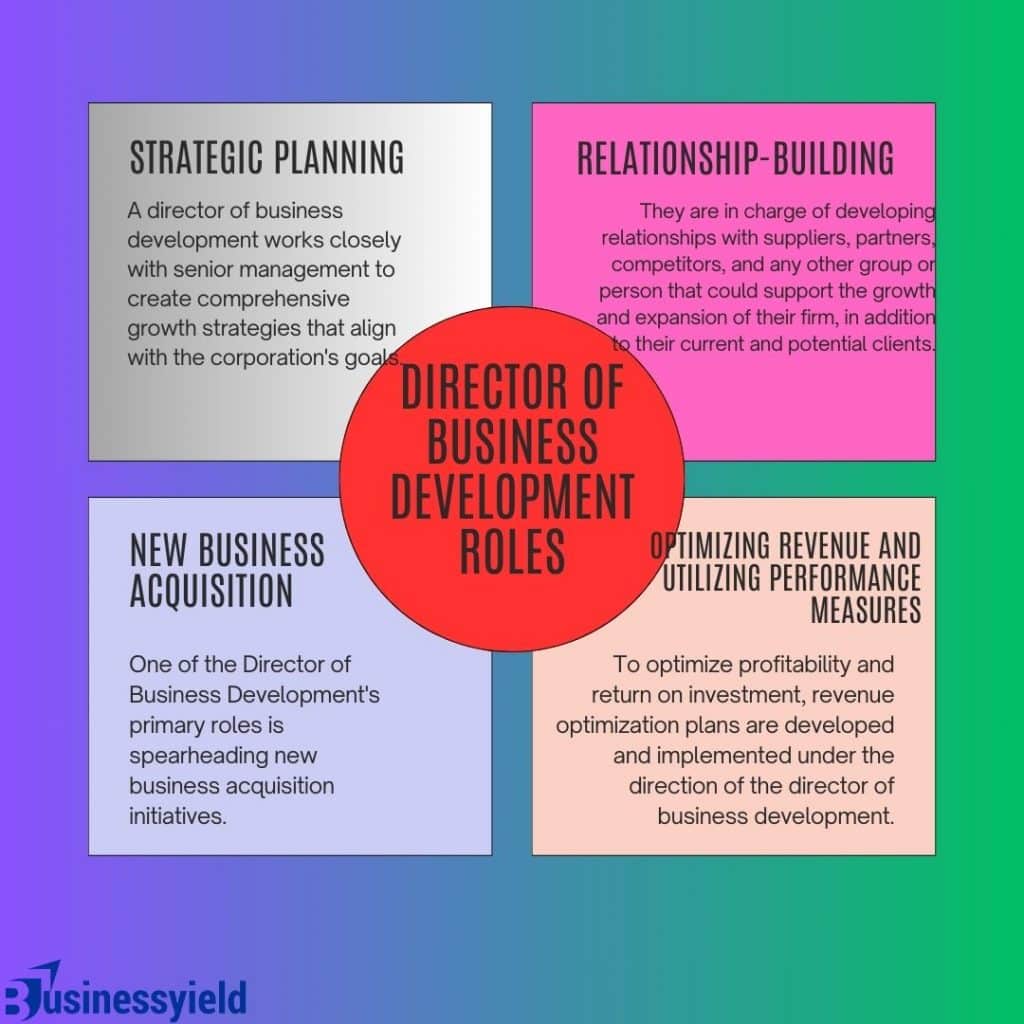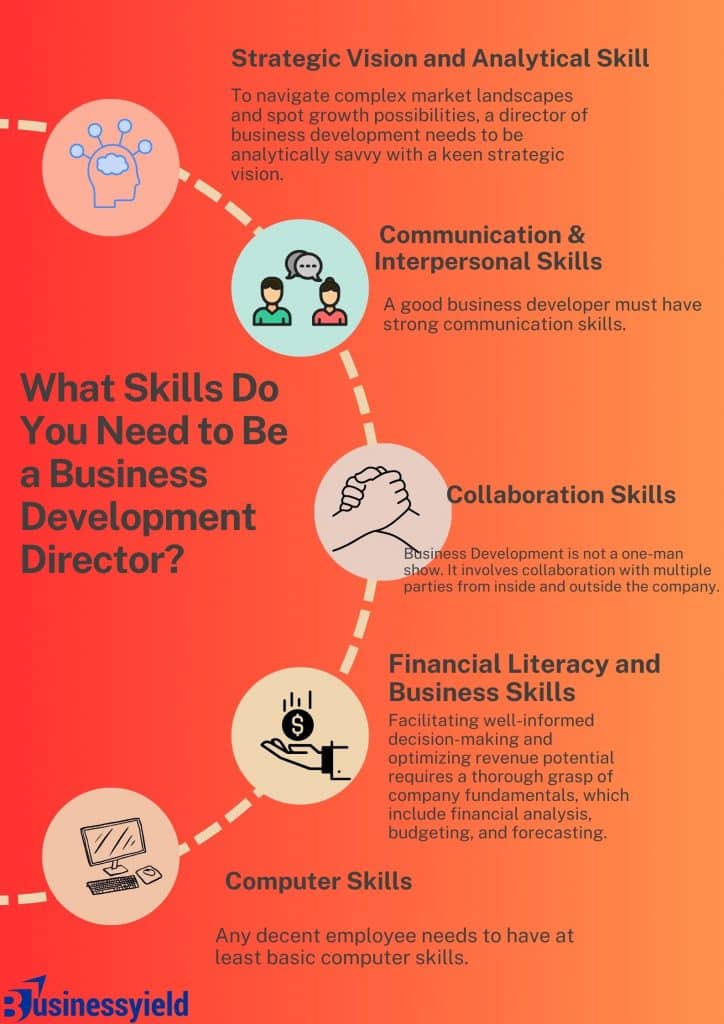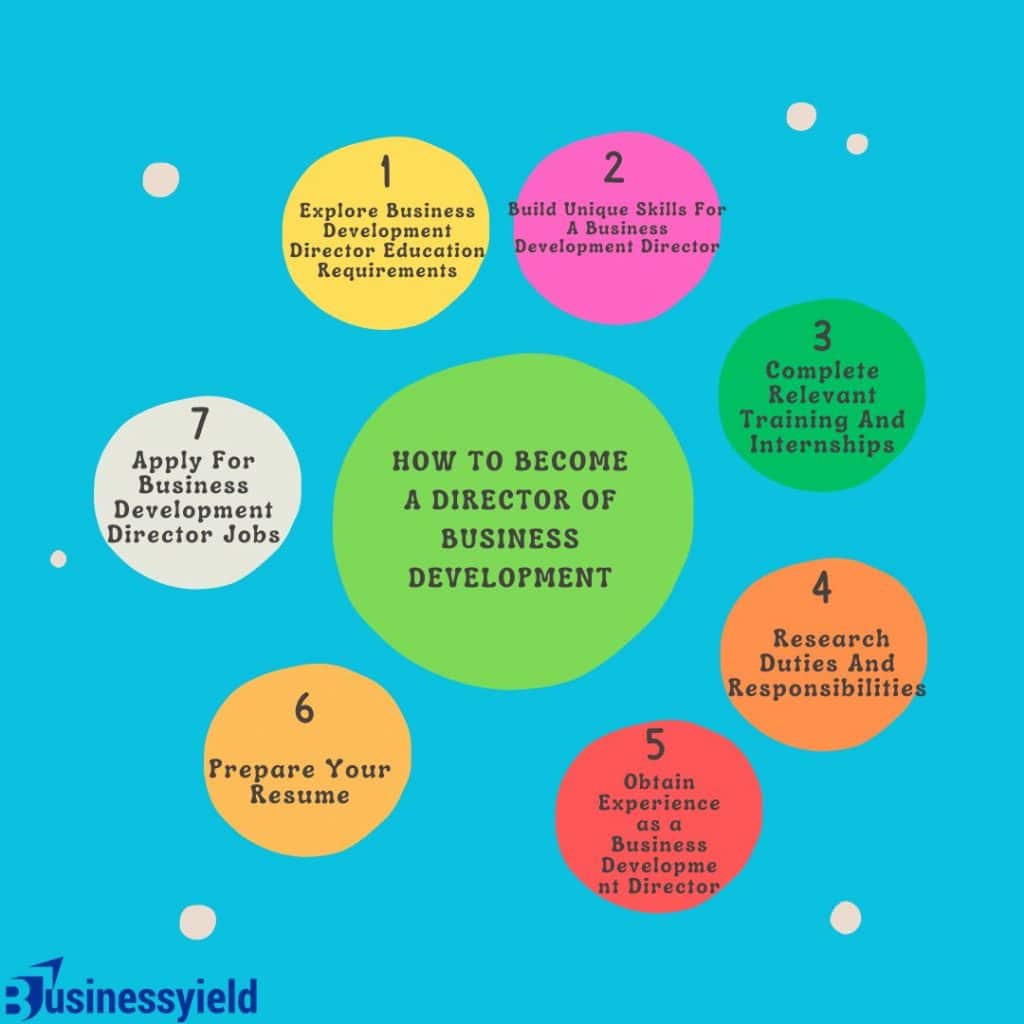An organization’s ability to succeed depends heavily on the work of a director of business development in today’s tough, changing business environment. This critical role combines market intelligence, relationship-building skills, and strategic vision to promote development and innovation. In this comprehensive guide, I will explain more about the skills of the Director of Business Development role, its responsibilities, and how much salary they earn.
But before we delve into knowing these sets of skills and how much they earn, have you asked yourself who or what a director of business development is?
Key Points
- The Director of Business Development occupies a strategic leadership position within an organization and is entrusted with the overarching responsibility of identifying, evaluating, and executing growth opportunities.
- Before you become a director of business development, you must master the following skills: strategic vision and analytical skills, communication and interpersonal skills, collaboration, financial literacy, business skills, and computer skills.
- As of March 2024, the average yearly salary for a director of business development in the US was $126,639.
Director of Business Development
The Director of Business Development occupies a strategic leadership position within an organization and is entrusted with the overarching responsibility of identifying, evaluating, and executing growth opportunities. This person usually leads a business development team or department and drives the company’s growth by finding new business opportunities and devising strategies for expansion. They propose and lead their company through joint ventures, mergers, acquisitions, and partnerships with other organizations.
Other key responsibilities and roles include:

#1. Strategic Planning
A director of business development works closely with senior management to create comprehensive growth strategies that align with the corporation’s goals. This calls for conducting competition analyses, evaluating market research, and spotting new trends to assist in making strategic decisions. The director draws lines for long-term company growth by foreseeing changes in the market and client wants.
#2. Relationship-Building
They are in charge of developing relationships with suppliers, partners, competitors, and any other group or person that could support the growth and expansion of their firm, in addition to their current and potential clients.
Read also: Building Business Relationship: Healthy Tips
#3. New Business Acquisition
One of the Director of Business Development’s primary roles is spearheading new business acquisition initiatives. Obtaining new alliances and clients entails prospecting and qualifying leads, planning sales pitches and presentations, and negotiating contracts. The director turns possibilities into profitable business opportunities by utilizing convincing communication skills and a thorough awareness of customer needs, which supports revenue growth and market expansion.
#4. Optimizing Revenue and Utilizing Performance Measures
Revenue optimization plans are developed and implemented under the direction of the director of business development to optimize profitability and return on investment. Improving operational efficiency and income production involves tracking key performance indicators (KPIs), examining sales funnels, and streamlining corporate procedures. The director incrementally improves company outcomes and sales performance through ongoing performance evaluation and iteration.
What Skills Do You Need to Be a Business Development Director?

Here are some skills that business development directors need to have:
#1. Strategic Vision and Analytical Skill
A director of business development needs to be analytically savvy and have a keen strategic vision to navigate complex market landscapes and spot growth possibilities. Effective problem-solving abilities, competence in conducting market research, and the capacity to transform data into meaningful insights are essential qualities for this position.
#2. Communication & Interpersonal Skills
A good business developer must have strong communication skills. They must communicate, present, assert, and speak to all the stakeholders involved. He must also be able to confidently cold-call prospects to gain new clients.
#3. Collaboration Skills
Business Development is not a one-man show. It involves collaboration with multiple parties from inside and outside the company. Any good business developer should be able to build relationships, influence, manage conflicts, and navigate through office politics to get things done.
#4. Financial Literacy and Business Skills
Facilitating well-informed decision-making and optimizing revenue potential requires a thorough grasp of company fundamentals, which include financial analysis, budgeting, and forecasting. Driving continuous growth and profitability requires the director to understand pricing strategies, revenue models, and market economics.
#5. Computer Skills
Any decent employee needs at least basic computer skills. Nevertheless, a business development manager must be highly competent in working with Microsoft Office. CRM software is also a must for this job.
How to Become a Director of Business Development

If you were to ask a group of directors of business development how they arrived at their current jobs, there’s a good chance you would get several different answers about the paths and steps each person took.
That said, there are still ways to develop a baseline understanding of the preparation necessary to become one.
The Best Adult Colleges and Careers Guide has gathered data to provide you with insight into the type of education commonly required for directors of business development to land a job. Here, I will provide you with a step-by-step guide on how to become a director of business development.
#1. Explore Business Development Director Education Requirements
Consider how much education you need to become a business development director. Based on real business development director resumes, 74.0% of directors have a bachelor’s degree. Regarding higher education levels, 16.5% of business development directors have master’s degrees. Even though most business development directors have a college degree, it’s impossible to become one with only a high school degree or GED.
Most Common Degrees
| Bachelor’s | 74.0 % |
| Master’s | 16.5 % |
| Associate | 5.7 % |
| Doctorate | 1.6 % |
| Certificate | 0.8 % |
| High School Diploma | 0.7 % |
| Diploma | 0.7 % |
| License | 0.0 % |
#2. Build Unique Skills For A Business Development Director
A business development director needs various skills, including communicating effectively, managing time well, and developing product line strategies. They should also be able to recognize fresh chances for income and cultivate important connections with clients. They must also be able to control complexity and lower production costs without sacrificing the product’s distinctiveness or the brand’s integrity. Additionally, they ought to have prior expertise in integrating design-to-manufacture into developing new products. They should be able to oversee corporate growth initiatives, such as contract negotiations, investor sourcing, and business planning and budgeting, for a global portfolio of new media start-ups.
| Skills | Percentages |
| Account Management | 3.94% |
| CRM | 5.29% |
| Customer Relationships | 3.97% |
| Healthcare | 8.82% |
| Project Management | 3.89% |
| Patients | 4.38% |
#3. Complete Relevant Training And Internships
Accountants spend an average of 1-3 months on post-employment, on-the-job training. During this time, new business development directors learn the skills and techniques required for their jobs and those of their employers.
#4. Research Duties And Responsibilities
A business development director’s responsibilities include direct sales, product management, client relationships, and strategic partnerships. They establish product line strategies, lead new product identification, and manage client interaction and stakeholder management. They also maintain a network of senior management relationships and implement design-to-manufacture into product development.
Their role involves managing quarterly business plans, coaching managers on customer-focused sales techniques, and building key customer relationships. They also conduct market analysis, develop winning proposals, and communicate complex technologies’ business benefits to C-level management.
- Create and manage business development, government affairs, and public relations initiatives to achieve this correctional healthcare company’s growth objectives.
- Achieve access to the SVP level, resulting in significant new business.
- Manage network services, e-ticketing and packaging solutions, CRM solutions, message management, and e-provisioning/identity management/security solutions.
- Lead centralized, electronic referral center coordinating the post-acute service needs of patients discharged from multiple acute facilities in the Arizona region.
#5. Obtain Experience as a Business Development Director
The average time to become a business development director is eight to ten years. Before becoming a business development director, the most typical positions were director of sales, account executive, and business development manager.
#6. Prepare Your Resume
You can start writing your business development director’s resume when your background is strong enough.
You can use the Businessyield resume template below to make the resume writing process easier while also ensuring that you include key information that hiring managers expect to see on a business development director’s resume.
Businessyield Business Development Director Resume Template
#7. Apply For Business Development Director Jobs
Now it’s time to start searching for a job. Consider the tips below for a successful job search:
- Look for appropriate postings on job boards.
- Consult your professional network.
- Make direct contact with organizations that you are interested in working for.
- Be wary of job scams.
Salary Director of Business Development: How Much Do They Earn?
As of March 2024, the average yearly salary for a director of business development in the US was $126,639.
Just in case you need a simple salary calculator, that works out to be approximately $60.88 an hour. This is the equivalent of $2,435/week or $10,553/month.
While ZipRecruiter is seeing annual salaries as high as $212,000 and as low as $50,000, the majority of Director of Business Development salaries currently range between $93,500 (25th percentile) to $151,500 (75th percentile), with top earners (90th percentile) making $194,500 annually across the United States. The average pay range for a Director of Business Development varies greatly (by as much as $58,000), which suggests there may be many opportunities for advancement and increased pay based on skill level, location, and years of experience.
Read also: SALES DIRECTOR SALARY: How Much Can They Make?
What Is the Difference between a Director and a Manager?

In some businesses, company directors and managers operate at different levels of authority; in others, the roles of director and manager are interchangeable. While most directors are managers, not all managers are at the director level.
Traditionally, the job description for a director supersedes even that of a senior manager. Directors operate at the highest level, often reporting directly to a company’s shareholders on the board of directors. High-level management might interface with directors but primarily do so to receive instructions. After they do, they work on implementing the director’s vision through their efforts and by delegating relevant tasks and projects to their team.
Smaller companies and startups (given that they have fewer employees and executive-level staff) might double up in directorial and managerial roles. In this case, directors also take on the role of middle management. In other words, rather than utilizing an intermediary, they interact directly with teams to implement their business strategy.
Here are several key areas where you can spot their differences:
#1. Strategic Areas
Directors formulate broad business plans for the company’s strategy, while general managers implement these goals through day-to-day operations. Directors, therefore, must deliberate at a more intellectual and idealistic level, while managers must get into the weeds.
#2. Daily Participation
Directors of companies spend their days planning long-term objectives and future tactics, but teams responsible for managing a company’s day-to-day operations should also be acknowledged. They put much effort into determining possible marketing tactics or predicting future financial trends. Managers, on the other hand, concentrate on carrying out business objectives right now.
Directors have the final say over the entire management team and the business, but managers have the final say over their teams. Nonetheless, directors frequently assign operations management responsibility for their business administration duties. Directors give managers the authority to make decisions required to fulfill their objectives.
#4. Degree of Expertise
Years of expertise in the sector you intend to oversee are crucial for securing a directorial or managing role. Director experience typically includes prior managerial experience. Thanks partly to this, directors get to be near the top of the executive team’s ladder in terms of authority, which also usually increases pay. Having a bachelor’s or master’s degree in a related discipline is beneficial for managers and directors.
#5. Area of Influence
Senior directors significantly impact whole departments within a corporation; numerous managers meet with them to discuss progress toward corporate objectives. On the other hand, senior management works closely with team managers who share similar responsibilities over particular teams.
Job Description Director of Business Development Template
With the job description template I have provided, you can get a good idea of what employers are looking for when hiring for this position. Remember, every employer is different, and each will have unique qualifications when hiring for a Director of Business Development role.
Businessyield Job Description-Director of Business Development Template
Is Business Development a Hard or Soft Skill?
Business development is a hard skill.
Bottom Line
In conclusion, the role of a director of business development is critical to modern businesses’ ability to grow, innovate, and sustain themselves over the long run. Directors of business development use their strategic vision, market knowledge, and interpersonal skills to navigate dynamic market situations and create new avenues for revenue generation and market expansion. They essentially operate as catalysts for organizational success.
I agree that getting a role in this career will make you a fortune if your motivation is money.
Similar Articles
- All You Need to Know About IT Director
- Marketing Director: Definition, Job description, Salary & Requirements
- MARKETING AND ADVERTISING: Differences Between Marketing & Advertising






